PLEASE NOTE:
While the following article relates to your Google search, the services and methods at Goodwin Hypnosis may differ from those mentioned below. Since 2007, we have helped thousands of clients to overcome emotional and behavioral challenges when all else had failed. According to many of them (and their referring healthcare providers), our methods are faster than talk therapy, easier than willpower, and safer than medication. If you’re ready to resolve your issues, skip the article and visit the rest of our website, where you can learn about our unique approach, watch client testimonial videos, and discover how working with us one-on-one could be the solution you’ve been searching for.
We can help you with a variety of issues relating to emotional trauma. While we don't diagnose disorders like PTSD, we have helped hundreds of clients to overcome a wide range of traumatic experiences and their negative effects with methods that are more efficient and comfortable than CBT or EMDR. If you would like to learn more about working with us one-on-one to clear your trauma, click here.
Introduction
The journey through relationship PTSD can often feel like navigating a labyrinth of emotional turmoil, where the echoes of past trauma linger and shape present experiences. For many, the scars left by toxic or abusive relationships lead to profound struggles with self-worth, trust, and the ability to form new connections. Understanding the origins and symptoms of this condition is essential for those seeking healing, as it illuminates the path toward recovery.
By exploring effective therapeutic interventions and coping strategies, individuals can reclaim their narratives, foster resilience, and ultimately transform their lives. This article delves into the complexities of relationship PTSD, offering insights and support for those on the path to emotional restoration.
Defining Relationship PTSD: Understanding Its Origins and Impact
The term for the psychological trauma from toxic or abusive connections impacts numerous individuals dealing with ongoing psychological and mental distress. This condition often emerges from experiences of betrayal, emotional abuse, or manipulation, leading to debilitating symptoms such as anxiety, depression, and a fundamentally altered self-image. Unlike traditional post-traumatic stress disorder, which typically arises from a single traumatic incident, relationship-related stress is often cumulative, resulting from a series of relational traumas that accumulate over time.
Dawne Vogt, a PhD specialist in the area, emphasizes,
While women are more likely than men to develop post-traumatic stress disorder, research generally suggests more gender similarities than differences in how women and men experience it.
This insight highlights the shared emotional journeys that many endure, regardless of gender. It is important to note that women typically experience trauma-related symptoms longer than men, averaging 4 years compared to 1 year before diagnosis and treatment.
Comprehending the roots of emotional trauma is essential, as it deeply affects how individuals view love, trust, and their own self-esteem. Low self-worth can intensify feelings of inadequacy, affecting not only connections but also career and financial stability. The differences between self-esteem, self-confidence, and self-worth are significant:
- Self-esteem reflects how much you value yourself.
- Self-confidence relates to your belief in your abilities.
- Self-worth is the intrinsic value you assign to yourself as a person.
Recent studies indicate that while women may experience fewer traumatic events than men, the severity of those events often correlates with a heightened risk for PTSD. This underscores the importance of recognizing and addressing the emotional impact of toxic relationships.
Therapeutic interventions such as cognitive behavioral therapy (CBT), prolonged exposure therapy, and hypnosis can significantly enhance well-being and quality of life. Hypnosis, in particular, can aid in transforming limiting beliefs and enhancing self-confidence, enabling individuals to reclaim their narrative and set personal goals for healing. Specific causes of low self-esteem often stem from negative life experiences, criticism, and unmet expectations.
According to testimonials from clients who have worked with Goodwin Hypnosis, many have successfully overcome anxiety, trauma, and grief, finding empowerment through understanding and reframing their mental processes. Furthermore, the online trauma recovery program offered by Goodwin Hypnosis provides accessible support for those seeking to heal from their experiences. By recognizing the intricacies of trauma from past connections and the possibility for personal growth through therapy, people can commence the healing process towards a more rewarding life.
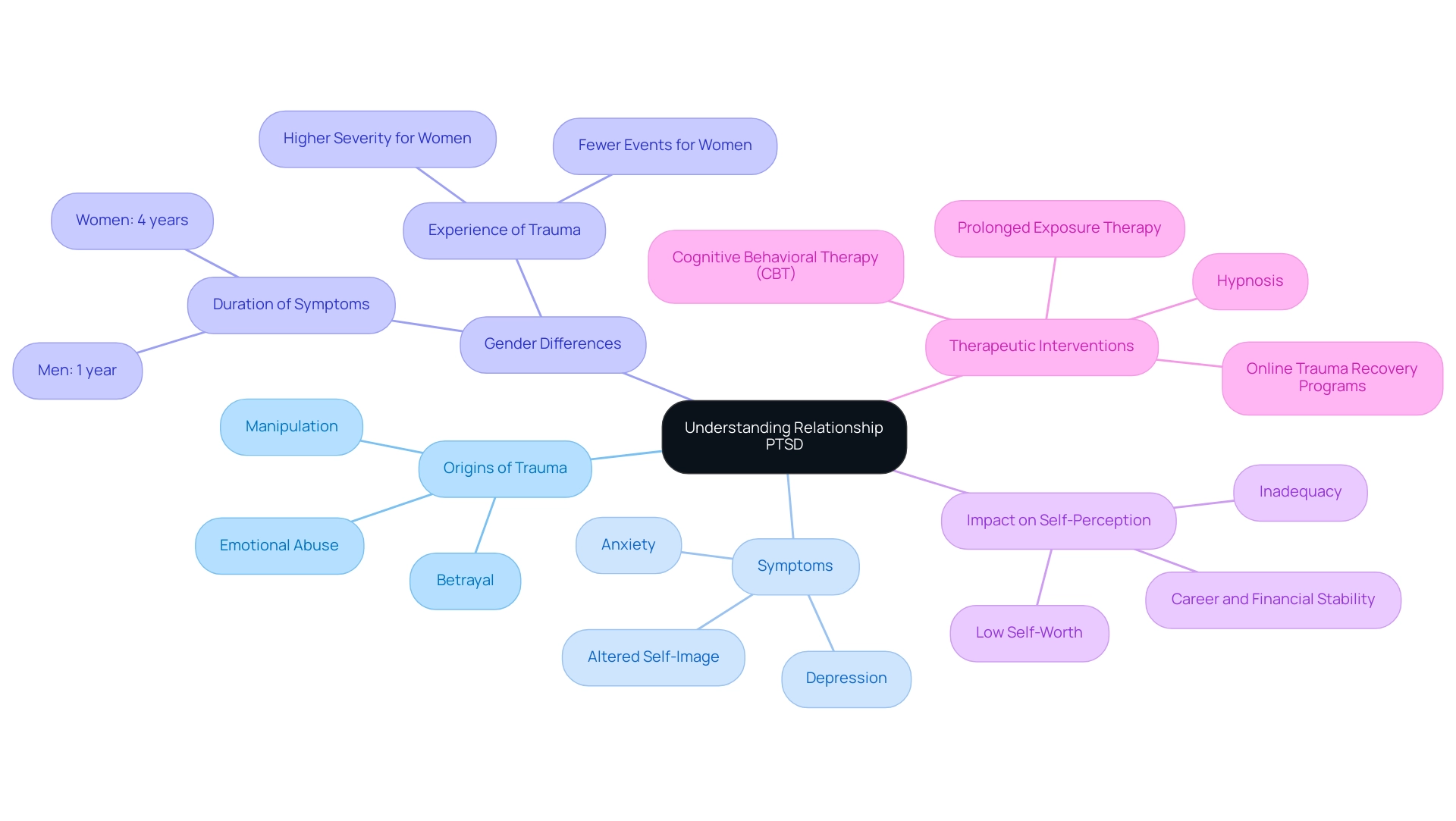
Recognizing the Symptoms of Relationship PTSD: Key Indicators to Watch For
Symptoms of relationship trauma often manifest as persistent feelings of fear and anxiety, hypervigilance, emotional numbness, and intrusive memories tied to the traumatic relationship. According to statistics, approximately 3.8% of people who experience significant relational trauma may develop post-traumatic stress disorder. These experiences can be particularly isolating, as people grapple with profound trust issues; studies indicate that a significant percentage of PTSD survivors report difficulties in forming new connections.
Emotional turmoil may also include a pervasive sense of guilt or shame, overshadowing their self-worth. Compounding these challenges, many endure flashbacks or nightmares that force them to relive distressing moments of trauma. For instance, one case study highlights the journey of a woman who struggled with trust issues after experiencing emotional abuse, illustrating how her connections were impacted by her trauma.
Recognizing these symptoms is crucial; it not only helps individuals validate their experiences but also serves as a vital first step toward healing. Embracing this journey involves engaging in safe, loving relationships that foster a sense of connection and support, as noted by Dr. Michael McGee. Many clients at Goodwin Hypnosis have shared transformative experiences in overcoming their trauma and anxiety through specialized techniques like hypnosis and NLP.
Comprehending these affective indicators can significantly empower trauma survivors to seek the help they deserve, ultimately guiding them toward recovery, relational fulfillment, and a renewed sense of self-worth. Additionally, it is important to recognize that trauma can stem from various experiences, including sexual assault, domestic violence, and emotional abuse, all of which can lead to profound psychological effects. By addressing these underlying issues, individuals can begin to heal and reclaim their lives.
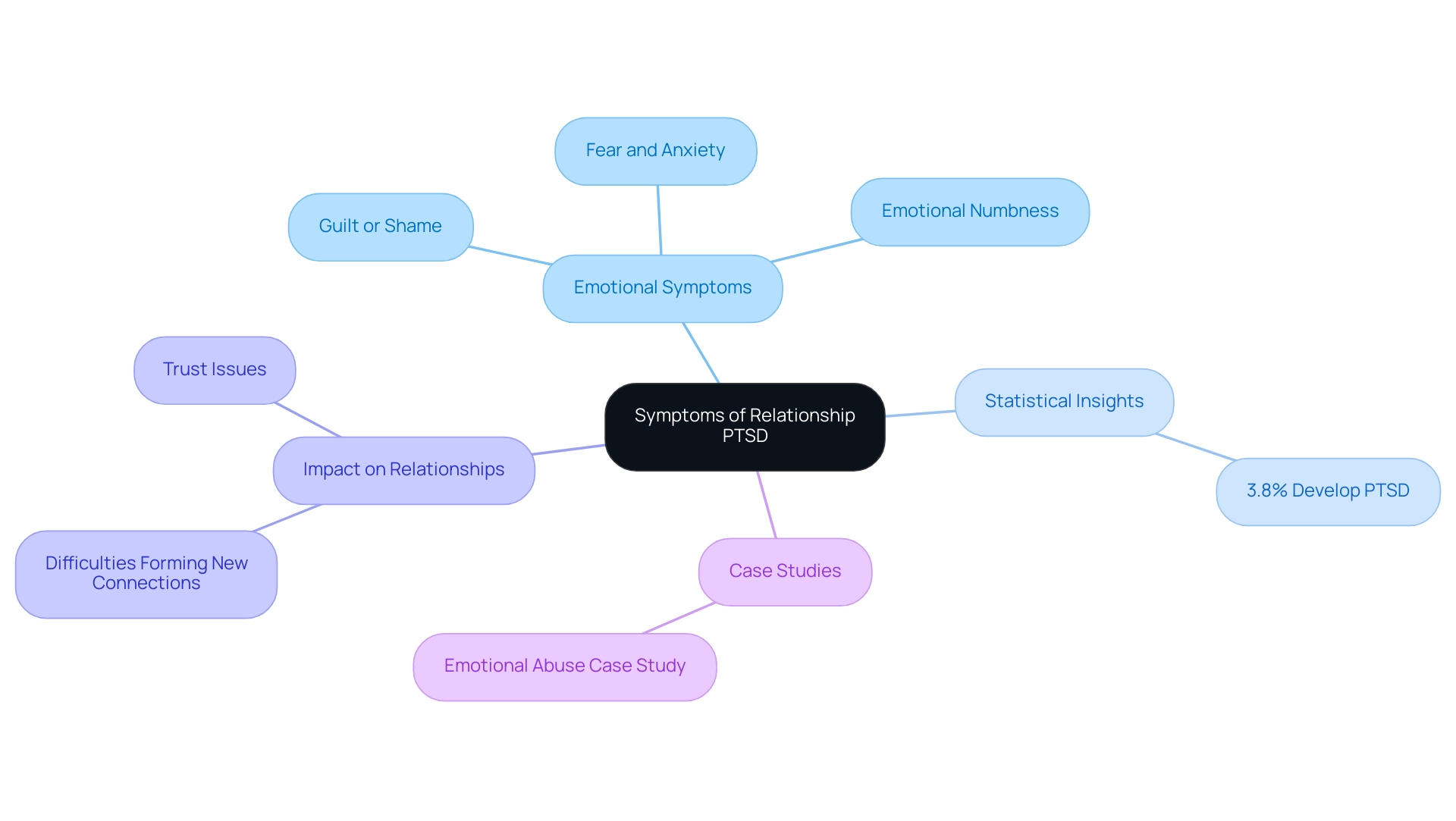
Exploring Treatment Options for Relationship PTSD: Pathways to Recovery
For those navigating the complexities of relationship trauma, a range of therapeutic options can offer promising pathways toward healing. Cognitive-behavioral therapy (CBT) is a widely recognized approach, with studies indicating that it can lead to a significant reduction in PTSD symptoms for approximately 60-80% of participants. This therapy empowers individuals to reframe negative thought patterns, paving the way for a more positive outlook.
Eye movement desensitization and reprocessing (EMDR) is another effective method specifically designed to help process trauma and reduce its psychological burden, achieving success rates of over 70% in treating trauma-related disorders. Additionally, hypnotherapy, particularly when combined with techniques like NLP and memory reconsolidation, can outperform even those mainstream psychotherapy methods by accessing subconscious memories and emotions to facilitate profound emotional healing.
Our one-on-one sessions concentrate on addressing specific symptoms such as anxiety, addictions, and relationship issues, ensuring a tailored approach to each person's needs. Numerous testimonials from clients highlight the effectiveness of these methods in alleviating anxiety and panic attacks, demonstrating their potential for transformation and recovery.
Support groups and peer counseling also offer invaluable community assistance, fostering a sense of connection and understanding among people with similar experiences. As noted by therapist Lillenstein, 'All participants who were interested in participating were given the opportunity to review consent,' emphasizing the importance of informed participation in these therapies.
Each of these therapeutic avenues offers unique advantages, and it is essential for people to explore which combination resonates with their personal healing journey. Embracing this exploration can be a significant step toward recovery and empowerment.
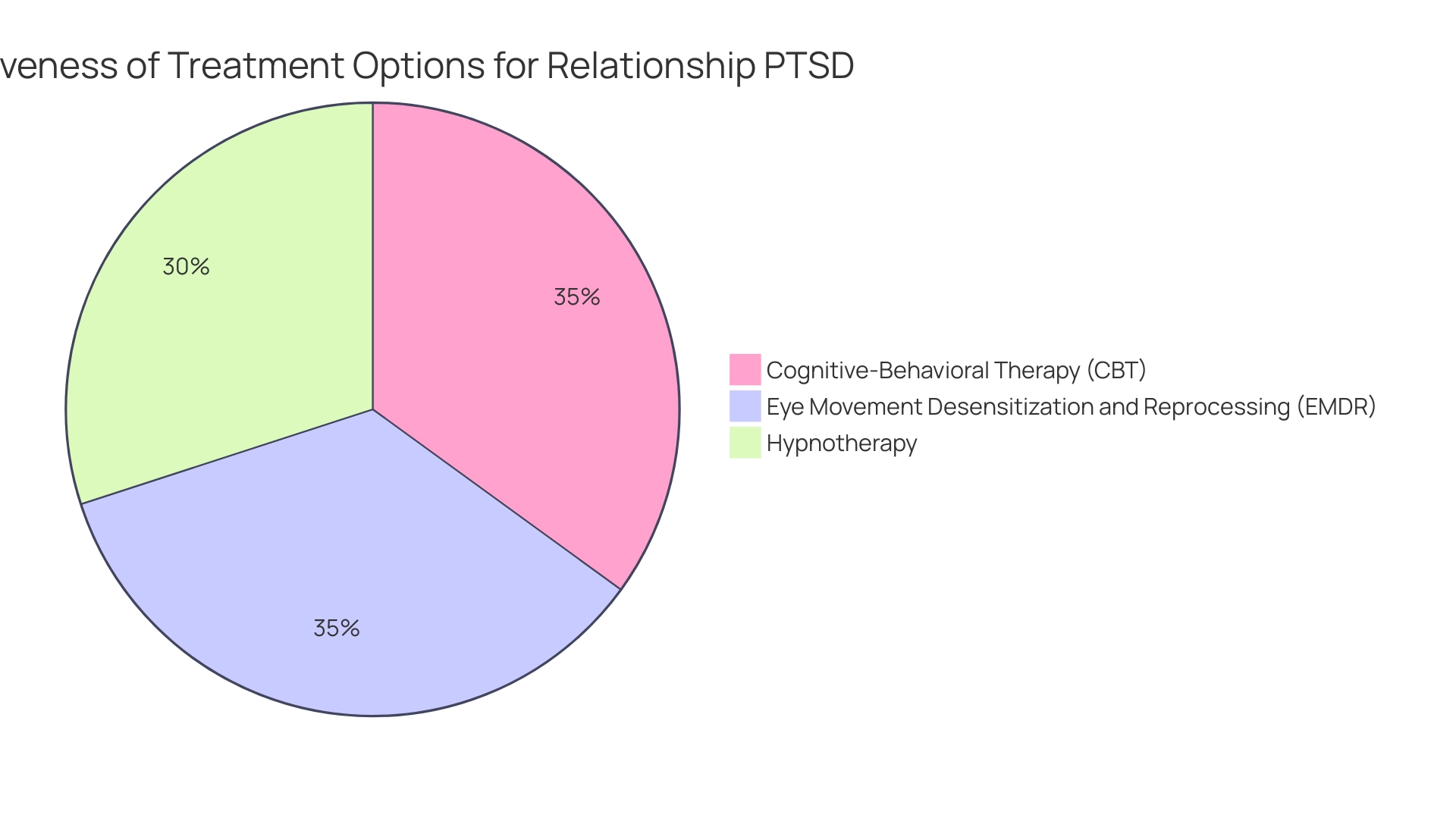
The Emotional Toll of Relationship PTSD: Effects on Mental Health and Relationships
The emotional toll of relationship-related trauma is often profound, manifesting as chronic anxiety, depression, and a diminished sense of self-worth. Approximately 13 million people in the U.S. experience post-traumatic stress disorder each year, impacting around 5% of the population. Furthermore, studies indicate that 3.8% of individuals who undergo natural disasters develop post-traumatic stress disorder, emphasizing the extensive prevalence of this condition.
This pervasive issue can create significant challenges in trusting others, which in turn hinders the ability to form meaningful connections. Research shows that individuals with trauma from past partnerships may face challenges in future connections, with studies indicating that nearly 70% express fears of intimacy or commitment due to previous psychological wounds. As many struggle with these feelings, they may unwittingly enter a cycle of isolation, further exacerbating their sense of loneliness and despair.
The emotional scars from past connections can cast long shadows, affecting future partnerships. For example, a case study involving a veteran showed that unresolved trauma resulted in repeated relationship failures, demonstrating the real-life effects of relationship-related trauma on mental health.
The journeys of people like Amber, who overcame PTSD and grief through various therapies, including the innovative techniques of board certified hypnotists Todd and Gina Goodwin, exemplify the potential for recovery. The Goodwins' expert trauma resolution program, which is available online via Zoom, specifically targets the root causes of psychological issues rather than merely addressing symptoms.
As mentioned by Denise-Marie Griswold, a Licensed Clinical Addictions Specialist, understanding and recognizing these effects is essential for healing—empowering individuals to reclaim their mental health and move toward healthier relational patterns. Moreover, positive treatment outcomes are possible; studies indicate that 46% of those undergoing psychotherapy show improvement within six weeks. Acknowledging these challenges is an essential step on the path to recovery, offering hope and a clearer understanding of one’s emotional landscape.
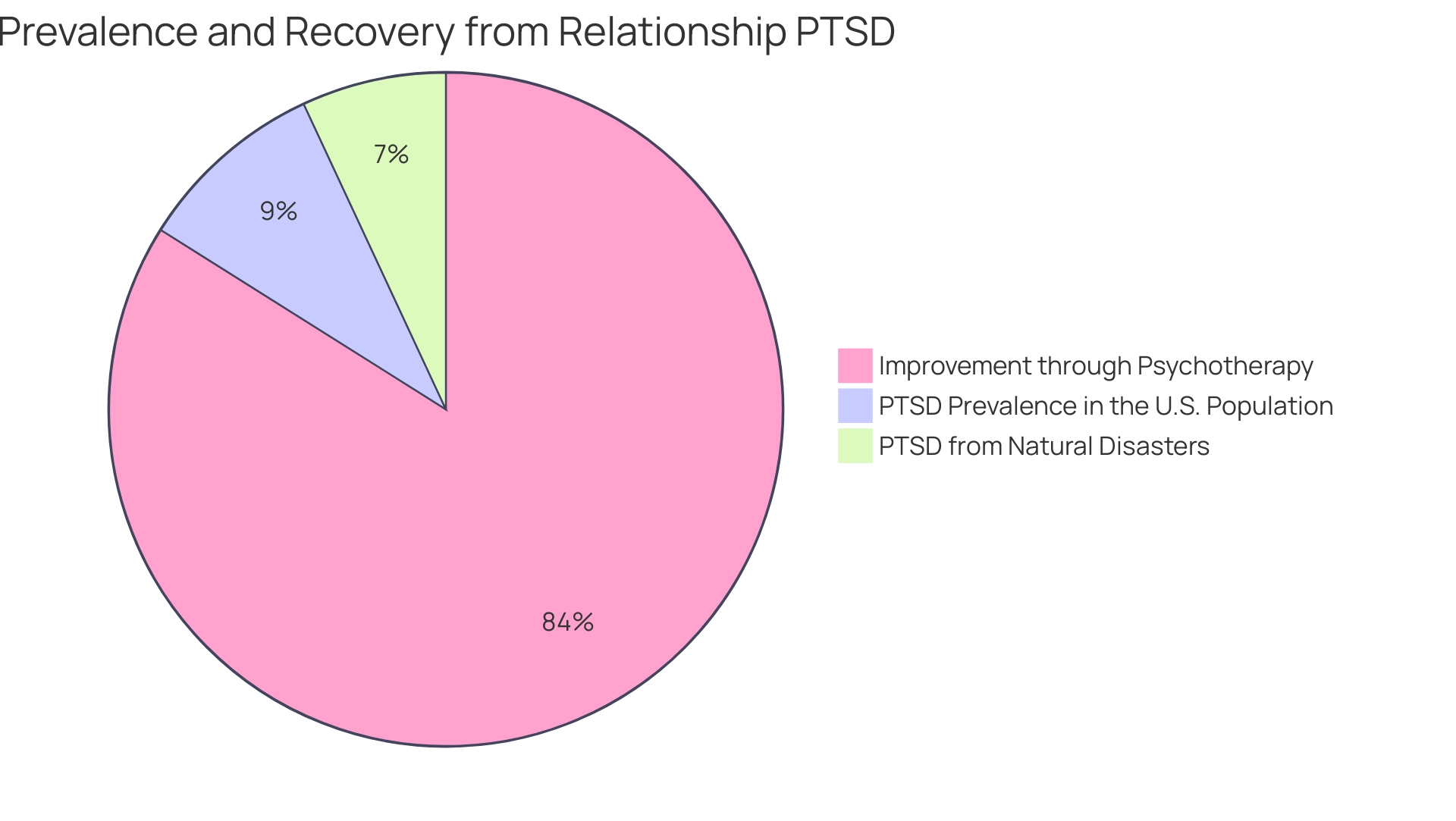
Coping with Relationship PTSD: Strategies for Healing and Support
Coping with relationship trauma requires a holistic approach that nurtures both the mind and the spirit. Mindfulness and meditation practices can be powerful tools, with studies showing that mindfulness can reduce trauma-related symptoms by up to 30%. Engaging in journaling offers a valuable therapeutic outlet, allowing for the exploration and processing of complex emotions and experiences. Journaling can assist people in articulating their feelings and gaining clarity on their experiences, which is essential for healing.
Establishing a strong support network through trusted friends, family, or dedicated support groups fosters understanding and resilience. The case study titled 'Relational Symptoms of PTSD' illustrates how PTSD symptoms can directly affect interpersonal relationships, leading individuals to feel they do not deserve healthy relationships and struggle with trust.
Incorporating self-care activities—like exercise, creative arts, or peaceful nature walks—can greatly improve overall well-being. Seeking professional guidance from therapists or counselors who specialize in trauma, like the expert team at Goodwin Hypnosis, can provide crucial support and direction on the journey to recovery.
Todd and Gina Goodwin, both board certified hypnotists and Master Practitioners of NLP, provide a customized online trauma recovery program that targets the root causes of trauma and its negative effects through hypnosis and NLP. Their clients, such as Amber, have shared transformative experiences, indicating that private intervention is a significant step toward breaking unhealthy habits and reclaiming personal empowerment.
As highlighted by mental health experts, a multifaceted approach not only aids in healing but also reinstates a sense of hope and empowerment in the face of trauma. If you believe emotional trauma is affecting your life, take the first step toward recovery by contacting Goodwin Hypnosis. They serve clients online and throughout the United States, including in Cary, Raleigh, and Durham, North Carolina, offering the support you need to overcome your challenges and achieve lasting change.
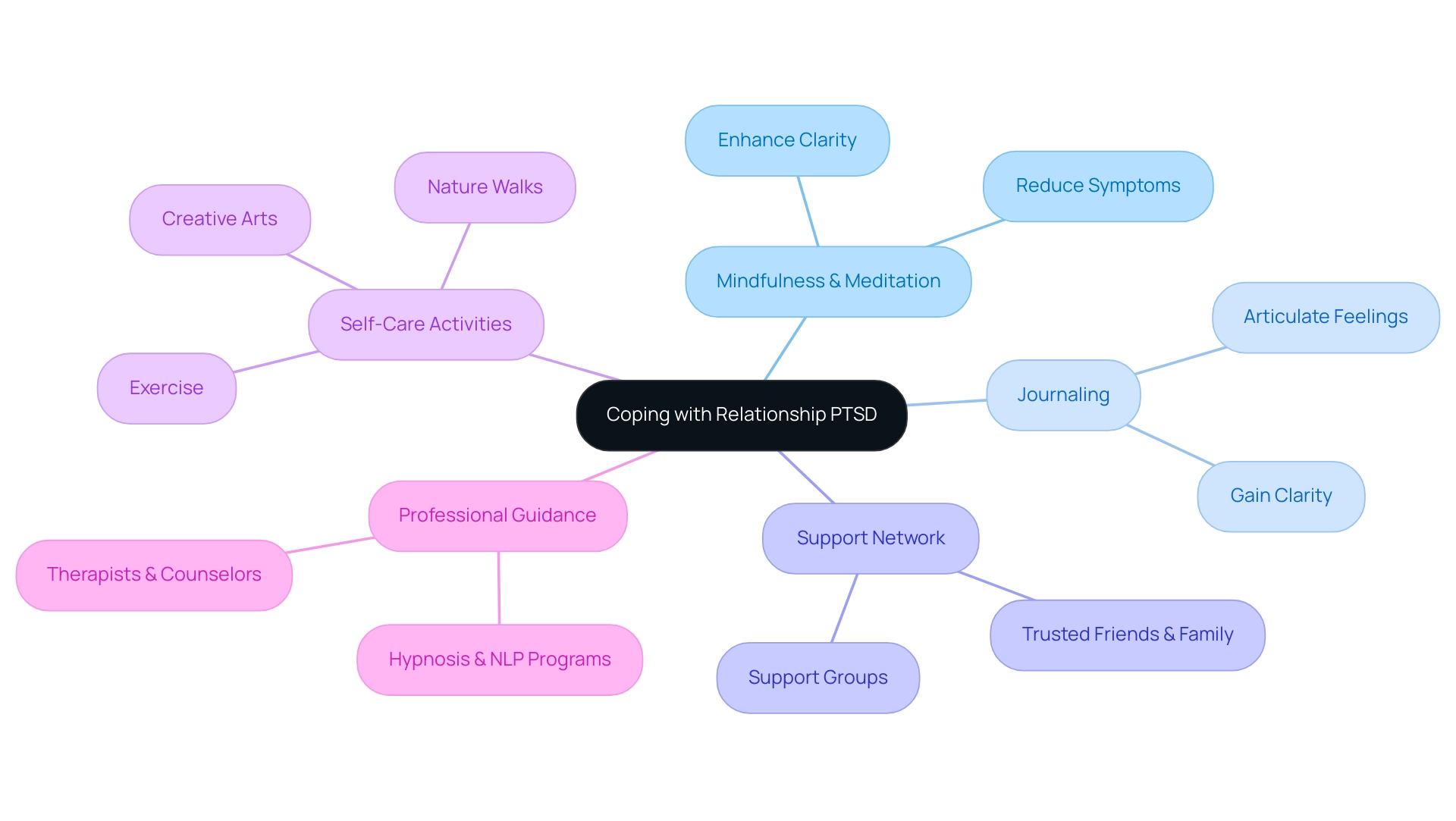
Conclusion
The journey through relationship PTSD is undeniably challenging, marked by emotional scars that can deeply affect one's sense of self and ability to connect with others. The insights shared about the origins and symptoms of this condition highlight the importance of recognizing its impact, as well as the ways it can manifest in everyday life. By understanding the complex interplay of factors that contribute to relationship PTSD, individuals can begin to validate their experiences and take the crucial first steps toward healing.
Exploring effective treatment options such as cognitive-behavioral therapy, EMDR, and hypnotherapy offers hope and pathways to recovery. These therapeutic interventions empower individuals to reframe their narratives, address the root causes of their trauma, and foster resilience. The transformative stories of those who have engaged with these therapies serve as powerful reminders that healing is not only possible but attainable.
Ultimately, the journey of overcoming relationship PTSD involves embracing a holistic approach that nurtures both the mind and spirit. By incorporating coping strategies and building supportive networks, individuals can cultivate a renewed sense of self-worth and forge healthier relationships. Recognizing that this path may be fraught with challenges is essential, yet it is equally vital to acknowledge the profound potential for personal transformation.
Healing is a journey worth embarking on, and with the right support and resources, a fulfilling life beyond trauma is within reach.




